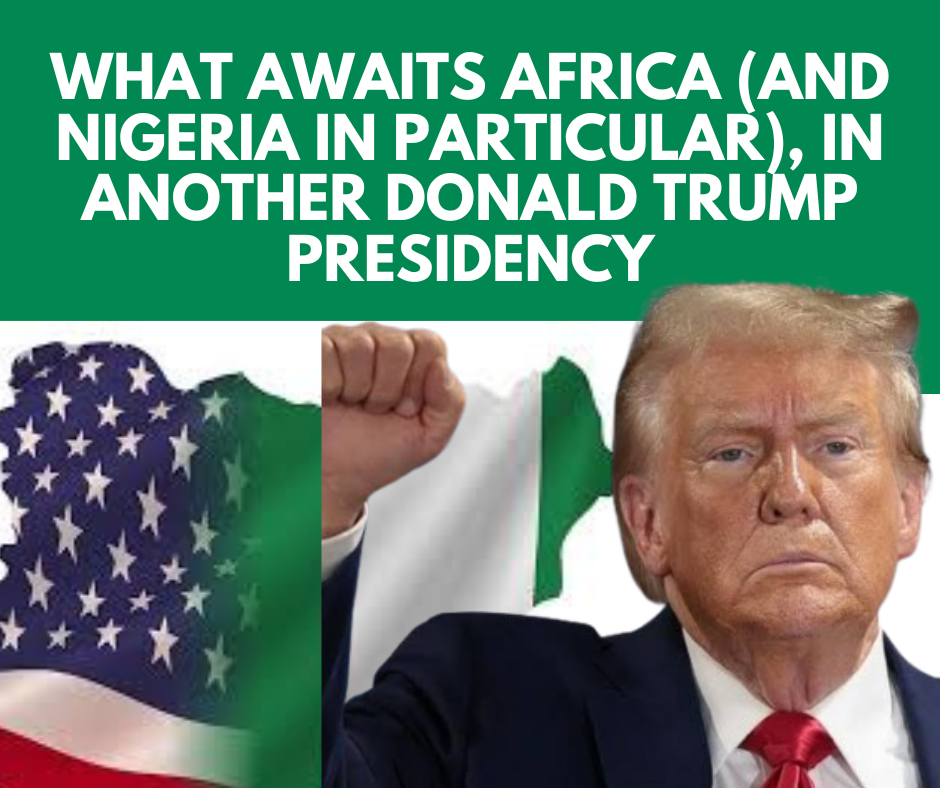We in African Economic Congress congratulate Mr Donald Trump on his 2nd term election as the President of the United States of America.
It may be too early in the day to predict what the the Trump presidency holds for Africa and Nigeria in particular. However by extrapolating from his 1st term in office (2016 – 2020) we’ll analyze this, based on historical patterns from Trump’s previous presidency, stated policy positions, and broader trends, while acknowledging the inherent uncertainty in such predictions. It’s a mixed bag for the African continent.
Here’s a detailed analysis of potential implications:
- TRADE RELATIONS
- Potential return to protectionist policies similar to 2016-2020
- Possible review/renegotiation of African Growth and Opportunity Act (AGOA)
The African Growth and Opportunity Act, which currently runs until 2025, could face significant changes or uncertainty under a new Trump administration - Based on Trump’s previous approach, potential changes might include:
a. Stricter eligibility requirements focusing on reciprocal trade benefits
b. More frequent reviews of country eligibility
c. Demands for better market access for US products in African countries
d. Possible reduction in the number of products eligible for duty-free access
e. Additional conditions tied to countering Chinese influence in Africa
f. Country-specific restrictions based on trade deficits with the US - Nigeria might face increased scrutiny on trade imbalances
g. Risk of tariffs on African exports to protect US industries
- IMMIGRATION
- Likely stricter visa policies affecting African nations
- Possible expansion of travel restrictions
- Nigeria could face enhanced vetting given its large population and previous inclusion in travel restrictions
- Potential reduction in diversity visa program benefiting African immigrants
- FOREIGN AID AND DEVELOPMENT
- Possible cuts to foreign aid programs in Africa
- Reduced funding for health initiatives like PEPFAR. The United States President’s Emergency Plan for Aids Relief (PEPFAR), saves lives, prevents HIV infections, and accelerates progress toward achieving HIV/AIDS pandemic control in more than 50 countries around the globe.
- More transactional approach to development assistance.
a. “America First” Principle - Aid would likely be more explicitly tied to direct US interests
- Support might depend on African nations’ alignment with US positions on global issues
- Less focus on long-term development goals, more on immediate US benefits
b. Quid Pro Quo Framework
- Aid could be contingent on specific actions by recipient countries
- Examples might include:
- Voting with US positions at the UN
- Supporting US security initiatives
- Providing preferential treatment to US businesses
- Reducing economic ties with China
c. Business-Style Negotiations
- Development assistance might be treated more like business deals
- Focus on measurable returns on investment
- Preference for projects that directly benefit US companies or interests
- Less emphasis on traditional development metrics like poverty reduction
d. Short-Term Deliverables
- Preference for projects with immediate, visible results
- Less interest in long-term capacity building
- Focus on infrastructure projects with clear US business involvement
- Reduced support for social development programs
e. Bilateral Over Multilateral
- Preference for direct country-to-country agreements
- Reduced support for multilateral development institutions
- More direct negotiation of terms and conditions
- Greater emphasis on visible “wins” for both sides
- Greater emphasis on countering Chinese influence rather than development
- SECURITY COOPERATION
- Continued but potentially reduced counter-terrorism support
- More focus on military cooperation tied to specific US interests
- Nigeria might maintain security partnership due to strategic importance
- Possible reduction in peacekeeping support
- Investment and Business
- Emphasis on private sector engagement over government aid
- Potential opportunities through proper Africa initiative
- More bilateral deals rather than multilateral frameworks
- Focus on extractive industries and infrastructure with US interests
- Diplomatic Relations
- More direct and transactional diplomatic approach
- Reduced engagement with multilateral African institutions
- Bilateral relationships prioritized over regional approach
- Possible tension over human rights and governance issues
- Climate Change Initiatives
- Likely reduction in climate-related support and funding
- Potential impact on green energy projects in Africa
- Possible withdrawal from climate commitments affecting African nations
- Nigeria’s oil sector might see short-term benefits from relaxed environmental policies
- Nigeria-Specific Implications
- Continued recognition of Nigeria’s regional importance
- Focus on security cooperation and anti-terrorism
- Possible pressure on governance and corruption issues
- Trade relations might face more scrutiny
- Oil sector dynamics could be significantly affected



